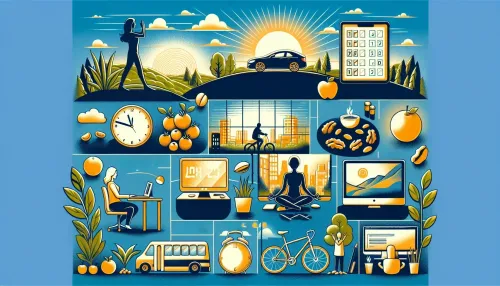Gratitude Practices: Fostering Positivity and Resilience in Everyday Life

In the hustle and bustle of modern life, the pursuit of happiness and contentment often takes a backseat. Amidst the chaos, nurturing mental well-being becomes paramount. One such powerful tool for enhancing mental well-being is the practice of gratitude.
The Transformative Power of Gratitude for Mental Well-Being
Gratitude, often described as the heartfelt acknowledgment of what one possesses or the recognition of what others have done for us, has substantial implications for mental health. It transcends mere politeness by fostering positive emotions, strengthening social ties, and even boosting overall well-being. By consciously acknowledging the goodness in one's life, individuals can cultivate a more optimistic and resilient outlook.
One of the most effective ways to integrate gratitude into daily life is through journaling. Keeping a gratitude journal where individuals reflect on things they are thankful for can significantly impact their overall mental state. This intentional practice encourages individuals to seek out the good in every situation, no matter how small, thereby shifting the focus from what might be lacking to what is abundant in their lives.
How Journaling Enhances Gratitude Practices
Every day, finding a few moments to jot down blessings – whether tangible or intangible – can gradually rewire the brain to adopt a positive bias, ultimately leading to improved mental well-being. This process not only enhances self-awareness but also serves as a tangible reminder of life's simple pleasures.
Incorporating gratitude into interactions with others amplifies its impact. By expressing appreciation for the people around us and acknowledging their contributions, individuals not only strengthen their relationships but also foster an environment of positivity and compassion. Acts of kindness, whether big or small, have profound implications not only on the recipient but also on the individual expressing gratitude.
Taking this practice further, individuals can actively seek opportunities to pay it forward through random acts of kindness. This amplifies gratitude's transformative power, creating a ripple effect that extends far beyond its initial expression.
Related Article: Unwind Your Mind: Mindfulness Techniques for Managing Daily Stress
Expressing Appreciation: Acts of Kindness and Acknowledgment
In times of stress and anxiety, intentional gratitude practices can act as a potent counterforce. It shifts the focus from negative rumination to positive reflection, thereby reducing stress levels and promoting emotional resilience. Fostering an attitude of gratitude doesn't imply ignoring life's challenges; rather, it equips individuals with a mindset that enables them to navigate difficulties with heightened emotional fortitude.
Research suggests that consciously focusing on gratitude can lead to reduced symptoms of depression and anxiety while enhancing emotional regulation. Integrating this approach into daily routines paves the way for sustaining mental well-being in the face of adversity.
Using Gratitude to Combat Stress and Anxiety
Gratitude possesses contagious properties; its expression extends far beyond individual benefits. As individuals embody gratitude in their daily lives, the positive energy they radiate influences those around them. This cascade effect fosters an atmosphere conducive to collective resilience and well-being.
Moreover, acts of genuine appreciation can uplift others' spirits, reinforcing bonds and creating an environment where sharing kindness and expressing gratitude become inherently embedded in social interactions.
The Ripple Effect of Gratitude on Relationships
To reap sustained benefits from gratitude practices, integration into daily routines is key. Setting aside specific moments during the day dedicated to acknowledging blessings or expressing gratitude can anchor this transformative practice in individuals' lives.
By creating habitual triggers such as mealtime reflections or bedtime appreciations, individuals can seamlessly infuse gratitude into their routines. Over time, this integration becomes second nature, fortifying resilience and fostering a sense of fulfillment irrespective of external circumstances.
In conclusion, the potency of gratitude in enhancing mental well-being cannot be overstated. Its transformative power lies in its ability to shift perspectives, nurture positive emotions, and fortify individuals against life's adversities. Through journaling reflections, acts of kindness, optimism cultivation, fostering ripple effects, and integrating daily routines with gratitude practices, individuals can pave a path towards lasting resilience and fulfillment.
Integrating Gratitude into Daily Life for Lasting Resilience
Remember, embracing gratitude isn't just about being thankful; it's about shaping a mindset that fosters positivity and strength amidst life's intricacies.
Frequently Asked Questions
Gratitude significantly enhances mental well-being by fostering positive emotions and strengthening social connections. It encourages individuals to acknowledge the goodness in their lives, which can lead to a more optimistic outlook and improved overall health.
Journaling allows individuals to reflect on their blessings daily, shifting focus from negativity to positivity. This practice enhances self-awareness and helps rewire the brain to adopt a positive bias, ultimately improving mental well-being.
Acts of kindness can range from simple gestures like writing thank-you notes to more significant actions such as volunteering or helping someone in need. These expressions not only strengthen relationships but also create a positive ripple effect in communities.
Gratitude practices shift focus from negative thoughts to positive reflections, acting as a counterbalance to stress and anxiety. By fostering an attitude of gratitude, individuals can enhance emotional resilience and better navigate life's challenges.
The best times to practice gratitude are during moments of reflection, such as mealtime or before bed. Setting aside specific times for acknowledging blessings helps integrate gratitude into daily routines, making it a natural part of life.
Everyone can benefit from practicing gratitude, regardless of age or background. It enhances mental well-being, strengthens relationships, and fosters a sense of fulfillment, making it a valuable practice for individuals seeking positivity in their lives.
Yes, expressing gratitude strengthens social ties by acknowledging others' contributions and fostering an environment of appreciation. This creates deeper connections and encourages a culture of kindness, benefiting both the giver and receiver.
No, expressing gratitude doesn't have to be verbal. It can be shown through actions, written notes, or even small gestures. The key is the intention behind the expression, which fosters positivity and connection.
Check Out These Related Articles

10 Easy Ways to Incorporate Wellness into Your Busy Schedule

The Wellness Journey: Avoiding Common Mindfulness Missteps

Mental Health Stigma Across Cultures: Unveiling Perspectives and Realities
